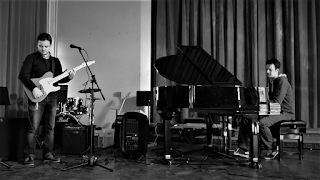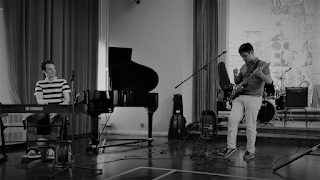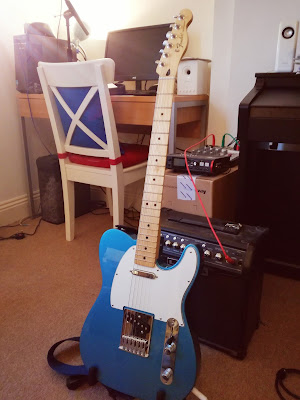The Echoes Sessions: Easter, 2017
This performance of 'Echoes' is the culmination of a week's work on this piece of music.
Our Arrangement
This performance is based upon an online backing track, which itself is modelled upon Pink Floyd's performance at Pompeii in 1971. Our drummer and bassist were unavailable for these sessions, but as the vocals, guitar and keys are the most complex parts in this song, it was still of value for Adam and I to get them right between us.
The digital stage piano emerged as the preferred key instrument for this piece after we decided we needed organ or synthesiser voices on the overdrive parts in the funk section of the song. Previously we had been mic-ing up a grand piano but it didn't cut through very well in the mix and could only do one thing. There are no piano parts for the keys on the original rhythm section, only organ parts, but we liked the jazz feel that the piano gave to the arrangement whilst the guitar is in support.
Of my two guitars, the best for this piece is Edgar, the Telecaster. He can play a characterful rhythm as well as a soaring lead, which suits what we were aiming for in this song: for the piano to lead in some parts, support in others, and vice-versa with the guitar. Cassius is very effective on rhythm, sitting lower and more discretely in the mix than Edgar, with a shimmering tone. He also has the advantage of having a floating bridge, enabling heavy use of the vibrato during the overdrive sections. However, the tone was less pure and, when leading, less soaring than Edgar's with less sustain. He did a respectable job of it during a rehearsal the previous day, but Edgar's voice is the most pleasing for this piece.
There are many ways of doing the funk section. Pink Floyd's studio version is sparse at first but becomes fuller, with a relentless, hypnotic beat underpinning it. In Pompeii in 1971 and Gdansk in 2006, the emphasis was more upon overpowering improvisational sections, especially Gilmour's, alternating between the organ and the guitar. Their otherwise unnotable rehearsal in Toronto in 1987 took a different stance, emphasising the rhythm guitar and setting the lead overdrive parts lower in the mix, with the organ more dominant and lending a lustre to the lead guitar when Gilmour took over. We decided the approach we liked best was their 1987 version, which felt more like psychedelic funk than rock, and we took many ideas away from it as well as adding our own ideas on how it could be done differently.
How We Did It
The Journey
 |
| From our first 'Echoes' session |
We had been mucking around with this song for some while. Knowing it well as I do, I assumed my performance would naturally be up to standard. It came as quite a blow, then, when we filmed ourselves playing without a backing track, only for me to realise that my playing was not up to standard on review, for two main reasons above all:
- I did not play in time
- I had misconceived how to execute the funk section
I spoke to a close friend of mine about these problems. He said he had had similar experiences when he had been studying music at Conservatoire, and that he had realised back then that he had to put his love of the piece to one side, in a way, and aim for what he called an 'out of body experience': divorce yourself from enjoyment of the music, lest you bash your way through it in a fit of fun; rein yourself in and focus instead upon precision, execution.
I took this advice on board.
I later shared with Adam how I would play the rhythm differently: less of a rock riff, more of a slick soft funk, lower in the mix and in support of, rather than competition with, his piano parts. The overdrive sections would need to be toned down as well: still dominant, but more predictable, less improvised and better mixed with a new organ part in order to give the audience an experience of a euphoric rush, rather than being just an opportunity to show off.
We made a demo track based on a backing track we found online, and were immediately thrilled with the result, deciding that this was it, this was how we wanted to sound. We could not wait to hear how it sounded live.
 |
| From our third 'Echoes' session, this time with Cassius |
Whilst Edgar was waiting for new strings, on the 11th of April we reconvened, this time with Cassius, and used the same backing track. When we reviewed the film footage, it was obvious that it worked and that we had found the right approach, for us at least, for this song. I proposed we convene again the following day to record the performance properly and produce a video.
The Recording process
In order to aim for a good quality music video, we had to record the sound separately from the video and then edit the two together.
The video is recorded on a mobile phone. The quality is not what we had hoped for, but there it is. That is the reason the footage is in monochrome: it disguises the picture quality. We shall have to use something else in future. Nonetheless, rendering it so does lend it the atmosphere of an early 1960s performance, which is no bad thing.
The audio is recorded on a portable digital recording unit, 'the black box', which can take down tracks separately from each other, much a like a recording studio, which is why the audio sounds so slick and 'studio' quality. There had been three tracks recorded: keys, fed directly into the box; guitar, which was picked up with a mic at the amplifier; and vocals, which is why I have two mics in the video: one for the PA, so that I could hear myself, and one for the black box. Unfortunately, the vocal mic did not pick up any signal, probably due to a faulty wire or connection, which is why the video only starts just after the second chorus had ended; it had been our intention to present as much of our performance as we could, but this fault prevented us from doing so.
Final Thoughts
We are very pleased with our performance on this video, and hope in time to be able to perform it for real. We are confident we have found an arrangement that is at once true to Pink Floyd's composition as well as one that is distinct and right for our own sound and style.
